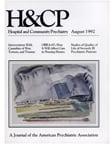State Hospital Patients' Views About Operation Desert Storm
Abstract
We found that patients in a state hospital were reasonably informed about Operation Desert Storm. Patients who had better orientation and patients who had spent less time in the hospital demonstrated a higher degree of knowledge, compared with longer-stay, less-well-oriented patients. The opinions of patients in this sample reflected those held in the wider society. Patients did not show significant cognitive on behavioral disturbances in response to this international crisis. We believe that these responses may be due to the insulating, stress-mediating factors associated with living in the hospital, compared with living in the community.
As we move forward with efforts to treat seriously and persistently mentally ill patients in the community, there is a lesson to be learned from inpatients' reactions to Operation Desert Storm. We must recognize that the state hospital still acts as an asylum in mediating the stress of national and international events. In stressful times, providers of community-based care must take steps to see that their services fulfill that stress-mediating function for patients who now live outside the traditional asylum.
Access content
To read the fulltext, please use one of the options below to sign in or purchase access.- Personal login
- Institutional Login
- Sign in via OpenAthens
- Register for access
-
Please login/register if you wish to pair your device and check access availability.
Not a subscriber?
PsychiatryOnline subscription options offer access to the DSM-5 library, books, journals, CME, and patient resources. This all-in-one virtual library provides psychiatrists and mental health professionals with key resources for diagnosis, treatment, research, and professional development.
Need more help? PsychiatryOnline Customer Service may be reached by emailing [email protected] or by calling 800-368-5777 (in the U.S.) or 703-907-7322 (outside the U.S.).



